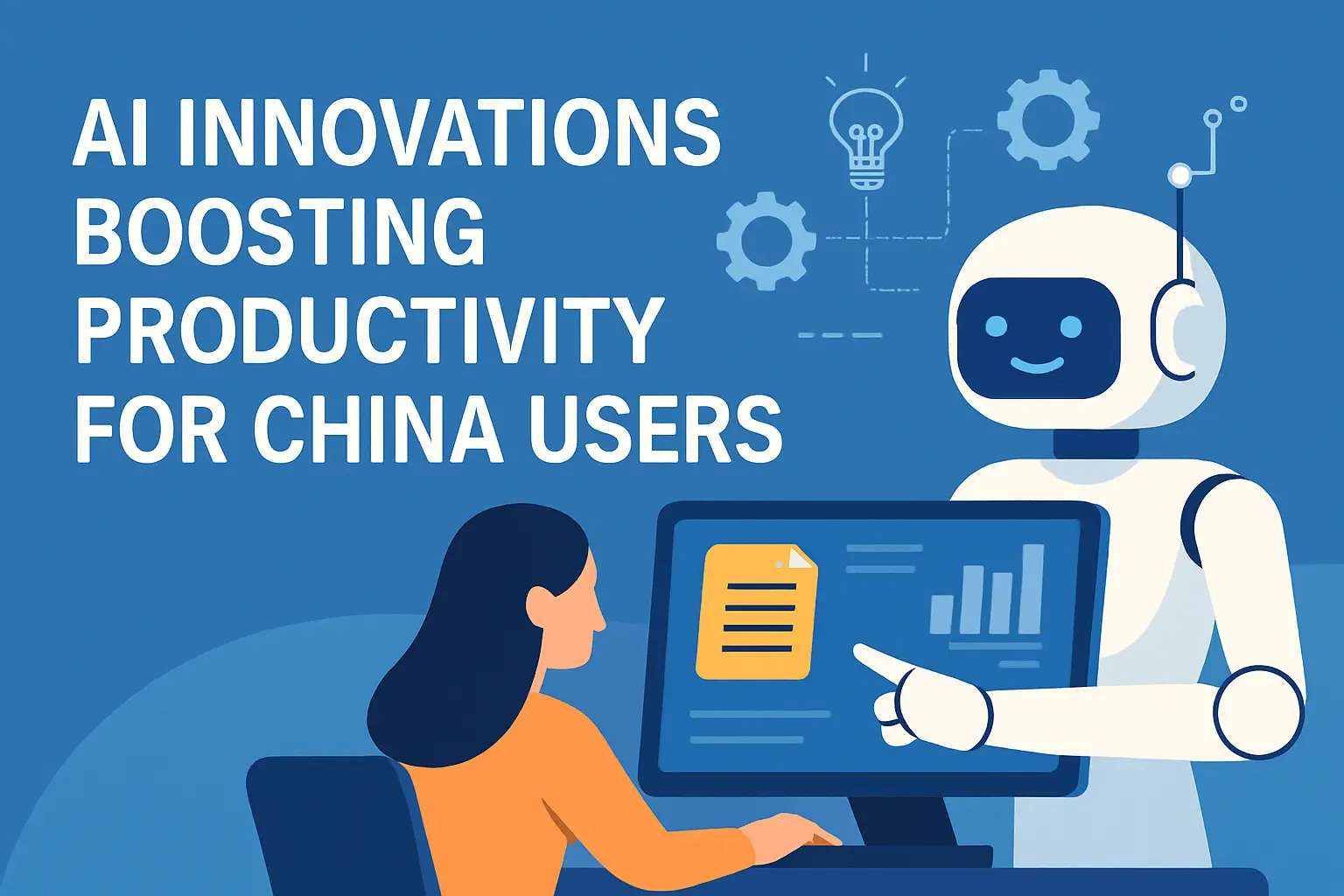Introduction: AI as a Catalyst for Efficiency in China
Artificial Intelligence (AI) has evolved from a futuristic concept to an indispensable tool in China’s fast-paced digital economy. No longer just a buzzword, AI is now a fundamental driver of workplace efficiency, personal productivity, and economic growth. From smart assistants to industry-specific automation, Chinese businesses, students, and professionals are leveraging AI to work faster, reduce errors, and unlock new levels of innovation.
China’s rapid AI adoption is fueled by government support, tech giants like Alibaba and Tencent, and a thriving startup ecosystem. According to a 2023 report by the China Academy of Information and Communications Technology (CAICT), the country’s AI market is projected to exceed $26 billion by 2026, with enterprise AI solutions leading the charge.
In this article, we explore the most impactful AI innovations transforming productivity across China’s workplaces, education systems, and daily life.

1. AI Work Assistants: Automating Routine Tasks
The Rise of AI-Powered Productivity Tools
Chinese tech giants have developed sophisticated AI assistants that streamline workflows, eliminating hours of repetitive tasks. Leading platforms include:
- Baidu’s Wenxin Yiyan (文心一言) – A ChatGPT-like AI assistant for research, drafting, and data processing.
- Alibaba’s Tongyi Qianwen (通义千问) – A business-focused AI that generates reports, analyzes trends, and automates customer interactions.
- iFlyTek’s SparkDesk (讯飞星火) – Specializes in voice recognition and real-time translation.
Key Features Enhancing Efficiency
These AI tools offer:
Real-time translation & summarization – Breaking language barriers in global business.
Automated report generation – Turning raw data into structured insights in minutes.
Smart content drafting – Assisting marketers, lawyers, and journalists with high-quality drafts.
Case Study: How a Shanghai Marketing Agency Cut Work Hours by 40%
A digital marketing firm integrated Tongyi Qianwen to automate social media content creation and client reports. Previously, employees spent 15 hours per week on manual tasks—AI reduced this to just 9 hours, freeing up time for strategy and creativity.
2. Smart Office Platforms: AI in Hybrid Work Environments
The New Era of AI-Enhanced Collaboration
With remote and hybrid work becoming standard, Chinese companies rely on AI-powered office platforms like:
- DingTalk (钉钉) – Alibaba’s smart workspace with AI meeting assistants.
- WeCom (企业微信) – Tencent’s enterprise communication tool with AI scheduling.
- Feishu (飞书) – ByteDance’s collaboration suite featuring AI analytics.
AI Features Reshaping Workflows
🔹 AI Meeting Transcription & Translation – Instantly converts speech to text and translates across languages.
🔹 Smart Summaries – Extracts key decisions and action items from long discussions.
🔹 Intelligent Scheduling – Automatically finds optimal meeting times across time zones.
Impact on SMEs and Large Enterprises
A 2024 survey by Tencent found that 72% of Chinese SMEs using WeCom’s AI tools reported faster decision-making, while 58% of large corporations saw reduced administrative costs.
3. AI-Driven Customer Service & Sales Optimization
How E-Commerce Giants Are Leveraging AI
China’s e-commerce leaders—JD.com, Pinduoduo, and Taobao—use AI to enhance customer interactions:
- AI Chatbots – Handle 80% of routine inquiries, reducing human agent workload.
- Personalized Recommendations – Algorithms boost sales by 35% (Alibaba 2023 report).
- Automated Follow-Ups – AI tracks customer behavior to send targeted promotions.
Case Study: Pinduoduo’s AI-Powered Farming Supply Chain
Pinduoduo deployed AI to predict demand for agricultural products, optimizing inventory and reducing waste. Farmers using the platform saw a 20% increase in sales due to smarter AI-driven logistics.
4. AI in Education & Skill Development
Personalized Learning with AI Tutors
China’s EdTech sector is booming, with AI-powered platforms like:
- Zuoyebang (作业帮) – AI homework helper used by 80 million students.
- Yuanfudao (猿辅导) – Offers real-time tutoring and exam prep.
- Squirrel AI (松鼠AI) – Adaptive learning for customized study plans.
Key Benefits for Students & Professionals
📚 Instant Homework Assistance – AI explains complex math and science problems.
📊 Performance Analytics – Tracks progress and identifies weak areas.
🎓 Corporate Upskilling – Companies use AI trainers for employee reskilling.
Government & Private Sector Investments
China’s "AI + Education" initiative has allocated $2.1 billion to integrate AI into schools, ensuring future-ready talent.
5. AI for Data-Driven Business Decisions
Transforming Industries with Predictive Analytics
Chinese firms use AI for:
📈 Market Trend Analysis – Ant Group’s AI predicts financial trends with 90%+ accuracy.
⚖️ Risk Assessment – Ping An Insurance uses AI to detect fraud.
📦 Supply Chain Optimization – AI reduces delivery times by 30% (JD Logistics).
Leading AI Solution Providers
- SenseTime (商汤科技) – Computer vision for retail and security.
- 4Paradigm (第四范式) – AI-powered enterprise decision-making.
- Megvii (旷视科技) – Facial recognition and warehouse automation.
Challenges & Ethical Considerations
Despite AI’s benefits, China faces challenges:
🔸 Data Privacy Concerns – Stricter regulations (e.g., China’s Personal Information Protection Law).
🔸 Job Displacement Fears – AI may replace 26% of routine jobs by 2030 (McKinsey).
🔸 Algorithmic Bias – Ensuring fairness in AI decision-making.
The Future of AI in China
By 2030, China aims to become the global AI leader, with advancements in:
🚀 Generative AI – More sophisticated content creation tools.
🤖 Humanoid Robots – AI assistants in healthcare and manufacturing.
🌐 Smart Cities – AI optimizing traffic, energy, and public services.
Conclusion: Embracing the AI Productivity Revolution
AI is no longer optional—it’s a necessity for staying competitive in China’s digital economy. From automating mundane tasks to enhancing decision-making, AI-driven tools are reshaping how businesses and individuals operate.
As China continues to innovate, professionals and companies must adapt quickly or risk falling behind. The question is no longer "Should I use AI?" but rather "How can I maximize AI to boost my productivity?"